Advertisement
Hockey, Politics And 'Treason': The 1950 Czechoslovakia National Team
Resume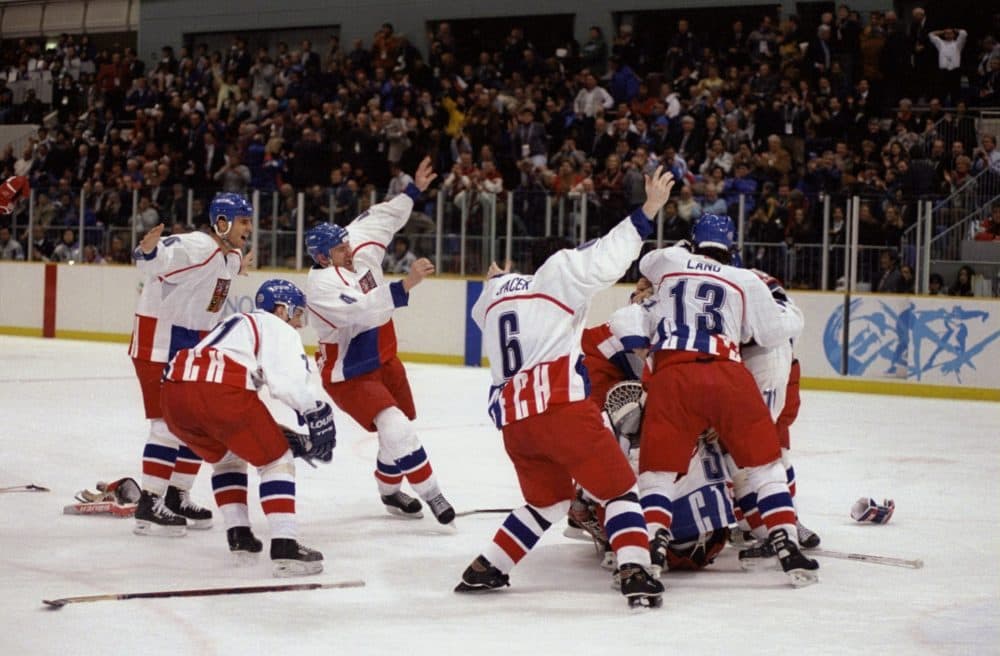
Bruce Berglund is a historian and a writer. He works at a small college in Minnesota. But back in the winter of 1998, he was living in Prague, doing research on his dissertation on 20th century Czechoslovak history.
And that February, an event was being held 5,000 miles from Prague, in Japan, that Czechs were following quite closely: the Nagano Winter Olympics.
"This was the first Winter Olympics that included NHL players," Berglund says. "So there was a lot of build up, a lot of excitement. And with that tournament, it was expected going into the tournament that Canada would come away with the gold medal. Canada was led by Wayne Gretzky. They had a roster that was stocked with players who are now in the Hall of Fame. The Russians were touted as one of the favorites. The Americans were touted as favorites. And the Czechs ended up surprising everyone."
In the semifinal, the Czech Republic defeated Canada in a shootout. In the final, they faced off against Russia.
"And, because the Olympics were in Japan, we had to get up early, early in the morning to watch the gold medal match," Berglund says.
"And a lot of Czechs tuned into that game, right?" I ask
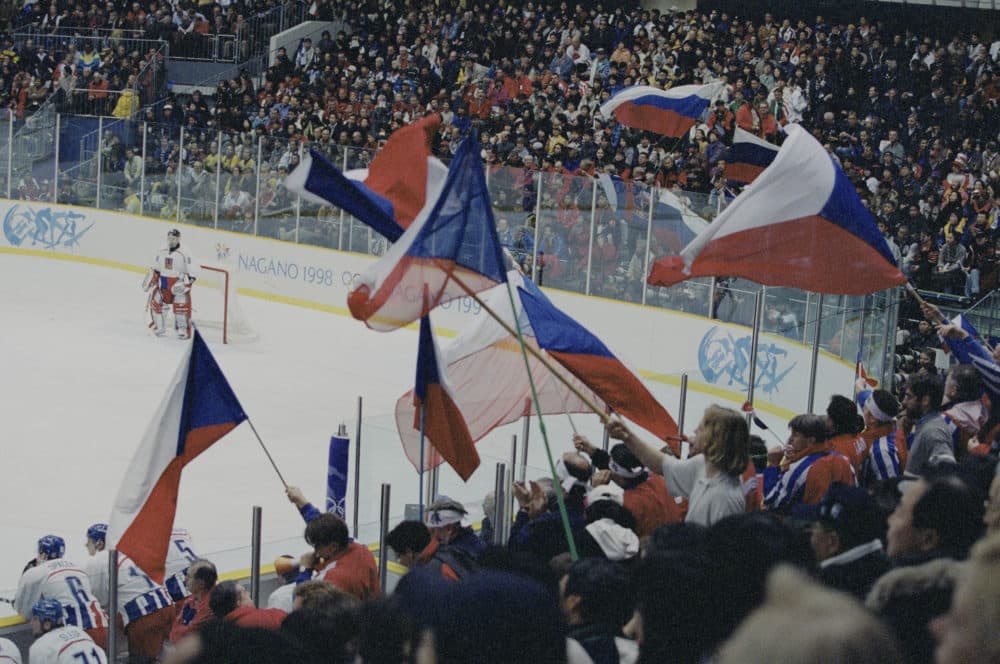
"Yeah, it's estimated that 80% of Czech adults at some point during the game were tuned in," Berglund says. "So I was in a small Czech town the day of the final match. And when the final horn sounded, when the Czechs had won, when they received their gold medals, everybody in the small town poured into the town square, cheering, singing, waving flags.
"The fire truck came down and drove around and and blared its sirens. A lot of alcohol was consumed for very early on a Sunday morning, and it was just this wonderful, enthusiastic celebration of the Czech hockey team."
The team returned home, flying into the airport on the outskirts of Prague.
"Crowds, huge crowds, at the airport there to greet them," Berglund says. "They stopped first at the president's house and they were out on the front lawn having shots of Slivovitz. They boarded the bus and went down into the center, where at least 100,000 people were packed into the old town square in the center of Prague."
So this moment was a big deal for Czechs for a bunch of reasons. For one, the Czechs had won world championships — before and after splitting from Slovakia. But they’d never won Olympic gold.
But as Berglund was talking to people in Prague, he realized that there was another reason Czechs were celebrating this win. It was a story that had been on people’s minds for a long time.
Widely Known Story
"This story of the 1950 hockey team, of the injustice that they experienced," Berglund says, "this is a widely known story among Czechs."
Berglund went back to Prague last fall. He visited the National Archives and the archives of the former state security services, known in Czech as the StB. And after viewing thousands of documents, he finally was able to piece together the story.
But to really understand what happened to the 1950 Czech hockey team, we have to go back to the end of World War II.
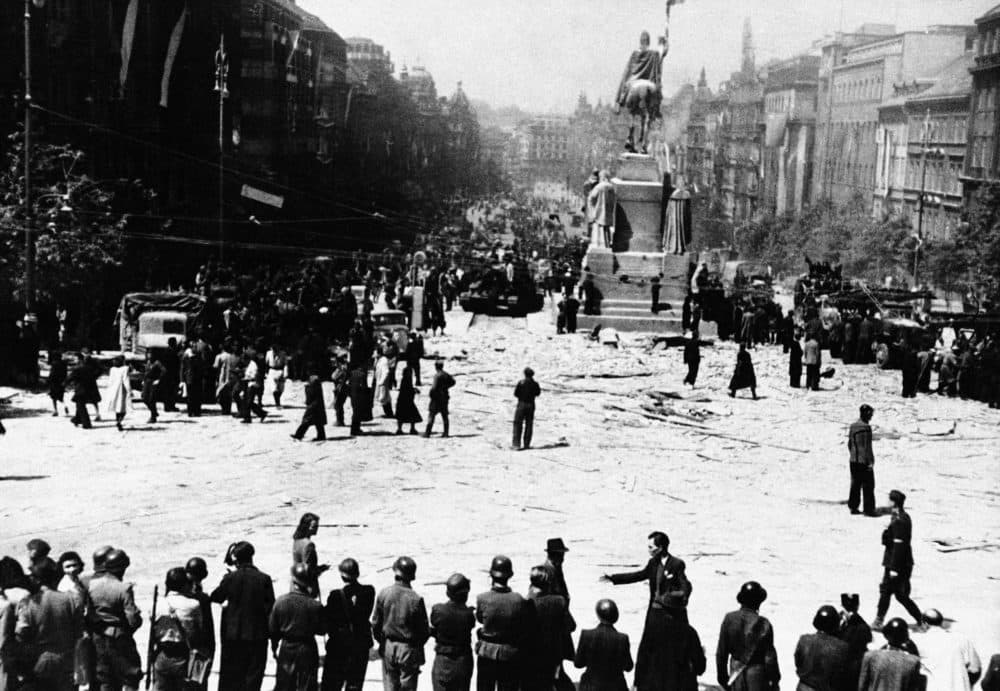
"People in Czechoslovakia were hungry for hockey after the war," Stanislav Konopásek wrote in his memoirs. He was one of the players on that 1950 Czechoslovak national team. He died in 2008. "We were happy when we could start playing international matches again. We had good results on our first trips, to Switzerland, Sweden and England."
"In 1947, Prague hosted the first hockey world championships to be hosted after World War 2," Berglund says.
Canada didn’t send a team to those world championships, and without the best team in the world in attendance, Czechoslovakia won.
And this was a big deal. Because Czechoslavakia was in a unique political position. It saw itself as a bridge between the communist Soviet Union and the democratic West. And so any international success the country had was really celebrated — as proof that Czechoslavakia could thrive in this middle ground.
But, while things were going great on the ice, political tensions were heating up.
"Czechoslovakia had a coalition government," Berglund says. "The president was a non-communistEdvard Beneš. The prime minister was the leader of the Communist Party. Klement Gottwald. In 1948, communist parties in Europe, they get the signal from Moscow that it is time to take full control of their governments.
"President Beneš recognizes that the situation is inevitable. A few months later,Beneš resigns, and Gottwald becomes the president of the country."
Through all this, and a plane crash that killed six members of the team in 1948, the Czechoslovak national team continued to compete – and they continued to win, even beating out the Canadians for the 1949 World Championships.
"So the following year, the 1950 World Championships are going to be staged in London, and the Czechoslovak national team is preparing to leave," Berglund says. "They go to the airport outside of Prague, and they don't board the plane."
"We waited a long time at the airport for our flight," Konopásek wrote. "We thought there must be some malfunction. After a time they told us that the flight was postponed until the next day. In the morning, we went back to the airport and waited again. Nobody believed anymore that there was a problem with the plane. After about two hours, the team manager and some security service officers came to announce that we were not flying to London."
"In 1948, communist parties in Europe, they get the signal from Moscow that it is time to take full control of their governments."
Bruce Berglund
"The security officers say, 'Well, two journalists accompanying the team have been denied their visas by the British,' " Berglund says.
"You don't want the people of Czechoslovakia to listen to the world championship over some foreign radio services, do you?" Konopásek remembered the security officers saying.
In other words, the players were told that in solidarity with the journalists and for the good of their country, they would be giving up their opportunity to win another championship ... for the good of their country. It didn't make a lot of sense.
"The players headed off to a pub. It was late in the evening. They were wanting to eat dinner. And when they went to the pub, they began to talk over beer of how angry they were, how upset they were with the government's handling of the team," Berglund says. "And while they're at dinner, it comes over the radio, a news announcement that the Czechoslovak hockey team had joined in solidarity with Czechoslovak journalists who had been denied visas by the British government. And this set the players off.
"They start swearing, they start cussing. They cussed out Gottwald. They cussed out the Communists. And of course, there were other people in the restaurant listening. And these people report to the police what's happening.
"So at about 9:00 p.m., the police show up, the StB. And the players are brought to the police station, and they undergo interrogation, including torture. The players were surprised to learn that they were being charged with treason."
"It was a huge shock," Konopásek wrote. "None of us had been interested in politics before. Never."
"The police are particularly interested in a man named Bohumil Modry," Berglund says. "Modry had been the team's goalie. During the summer and fall of 1949, Modry became more and more disenchanted with the way the team was organized, and particularly the way the communist sports authorities dealt with the national team.
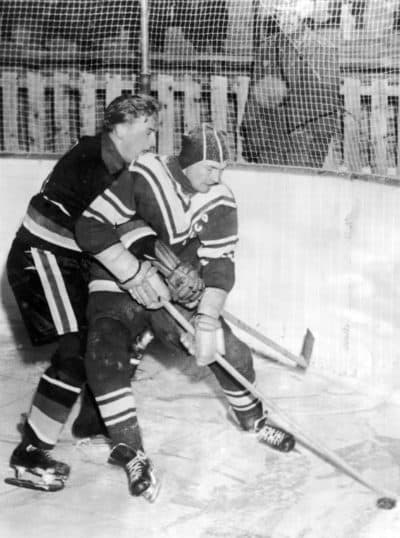
"And so Modry had left the team before this planned trip to London in 1950. The questions kept revolving around Modry and Modry's contacts with foreigners, particularly with Americans who worked at the U.S. Embassy in Prague. And it was the case that Modry did have contacts with an American at the U.S. Embassy. Modry did introduce this American to other members of the team.
"So the charges were not fabricated. There were indeed connections between the hockey players and westerners. Talk of defecting, talk of emigrating had been circulating among the hockey players ever since the communists took power in 1948."
"The trial was very simple," Konopásek wrote.
"The trial is really perfunctory," Berglund says. "Their guilt had already been determined. They have the sense that word had come down from up above from higher authorities, that they were an anti-state element. And in a communist state, in communist Czechoslovakia, this was a high crime."
The players had individual greivances about the way their team had been treated, but they didn't think of themselves as an anti-state group.
"No," Berglund says. "But because the communists were still new in terms of having power in Czechoslovakia, they had to demonstrate that nobody, including the world champion hockey players, was excused from 'socialist justice.' "
Twelve players were put on trial. Twelve players were convicted. Their sentences ranged from 15 years for Modry, the goalie, to eight months for a player deemed to be less involved in the plot.
And this wasn’t going to be easy time at a country club jail.
Sent To The Mines
"The players were sent to work in the uranium mines in the western part of Czechoslovakia, close to the German border," Berglund says. "And really, this is notorious as one of the worst places of communist oppression, a work camp extracting uranium which was used for the Soviet military in conditions without any safeguards whatsoever."
"We wore no masks," Konopásek wrote. "We breathe uranium dust fully into lungs. Uranium was on our clothes all the time. We didn't even have a shower. After work we just wash them before going to bed."
"So these were terrible conditions and the state police really had no regard for the health of the prisoners, whether hockey players or any other kind of prisoner," Berglund says.
"The players were released in 1955," Berglund says. "So this comes after the death of Stalin in 1953. And shortly after that, the death of Klement Gottwald, the president of Czechoslovakia. Many of the players are allowed to return to hockey. They play in the highest league in Czechoslovakia, but none of them are allowed to play for the national team again.
But...why?
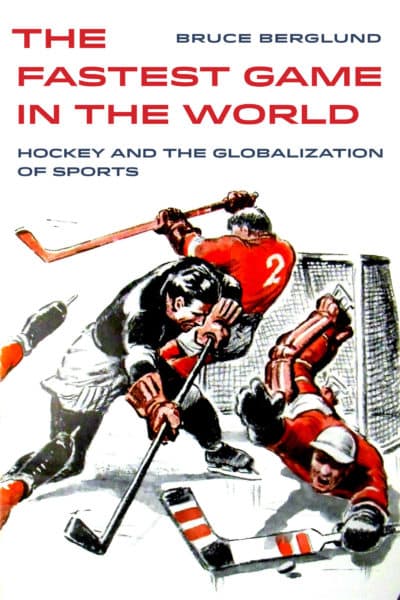
"In my opinion, the whole event was managed from Moscow," Konopásek wrote.
"Stanislav Konopásek, he makes the case that this was something that was ordered from Moscow," Berglund says. "And the reason was, that it was at this time in the late 1940s, in the early 1950s, that the Soviet Union was developing their own hockey program. So, by getting the world champion Czechoslovak hockey team out of the way, this would open up the path for the rise of the Soviet hockey team."
And that plan worked.
More Than A Sporting Event
"So, knowing this whole story, how does that shape how you see what you saw in '98 with the great celebration over the Olympic win?" I ask. "Because it feels like more than just a win in a sporting event."
"During the winter of 1997, 1998, this was really a difficult time in the Czech Republic in terms of politics, in terms of the economy," Berglund says. "The economy was slowing down. So this was roughly a decade after the Velvet Revolution, the end of communism. There were a lot of questions at this time as to what ... the transition to democracy and capitalism [had] brought.
"One of the newspaper headlines after the Olympic win in 1998 called this the 'Victorious February.' When the communists took power in February of 1948, they called their bloodless coup 'Victorious February.' And so the headlines 50 years later, in February 1998, were intended to suggest that our difficult history of living under communism and then the difficult transition from communism, in some ways this has been mitigated. That we have a new 'Victorious February.' "
Bruce Berglund upcoming book is called "The Fastest Game in the World: Hockey and the Globalization of Sports." Our thanks to stage actor František Špaček for the dramatic readings of translated passages from the memoirs of Stanislav Konopásek.
This segment aired on March 14, 2020.
